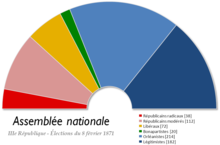Cabinet Dufaure I (France)
Cabinet Dufaure I | |
|---|---|
54th Cabinet of France | |
 The cabinet at the end of 1872. | |
| Date formed | 19 February 1871 |
| Date dissolved | 18 May 1873 |
| People and organisations | |
| President[a] | Adolphe Thiers |
| Head of government | Jules Dufaure |
| Member parties |
|
| Status in legislature | Majority 580 / 638 (91%) |
| Opposition parties |
|
| History | |
| Election(s) | 1871 legislative election |
| Predecessor | National Defence |
| Successor | Dufaure II |
The First cabinet of Jules Dufaure was the 54th cabinet of France and the second of the Third Republic, seating from 19 February 1871[1] to 18 May 1873,[2] headed by Jules Dufaure as Vice-President of the Council of Ministers[3] and Minister of Justice, under the presidency of Adolphe Thiers.
History

The Government of National Defence, having led the republic during the Franco-Prussian War, signed the Armistice of Versailles which provided for new elections in the National Assembly to establish a more legitimate government.[4]
The cabinet was formed following the
the Republic was merely seen at that time by royalists as a system of transition before the return of a constitutional monarchy.However, Jules Dufaure succeeded in assembling a coalition of
On 18 May 1873, Adolphe Thiers, wishing to reorganize the government and to make it more republican leaning, asked the cabinet to resign and tasked Jules Dufaure to form a new one, leading to the formation of the Cabinet Dufaure II.[2]
Actions
The main actions of the government were to deal with the Paris Commune[7] and to end the Franco-Prussian War by conducting negotiations with Bismarck before signing the Treaty of Frankfurt and reducing the indemnity requested by Prussia to five billion francs.[5]
It also supervised the reorganization of the French Army in order to provide it with manpower equivalent to that of the Prussian Army and to professionalize it,[8] and finally dissolved the National Guard now seen as a major threat to the republic and the regular army.[9]
Composition
| Vice-President of the Council of Ministers : Jules Dufaure | ||||||
| Portfolio[b] | Name | Took office | Left office | Party | Ref. | |
|---|---|---|---|---|---|---|
Opportunist Republicans | [1] | |||||
Opportunist Republicans | [1] | |||||
| 2 August 1871 | 18 May 1873 | Centre-right | [10] | |||
Orleanist | [14] | |||||
Legitimist | [11] | |||||
Minister of Navy and Colonies | 19 February 1871 | 18 May 1873 | Centre-left | [1] | ||
Opportunist Republicans | [1] | |||||
Orleanist | [13] | |||||
| 23 April 1872 | 18 May 1873 | Centre-left | [15] | |||
Legitimist | [1] | |||||
| 7 December 1872 | 18 May 1873 | Centre-right | [16] | |||
Orleanist | [15] | |||||
| 7 December 1872 | 18 May 1873 | ALP | [16] | |||
| Undersecretary of State for the Ministry of Interior | Marc-Antoine Calmon | 23 February 1871 | 7 December 1872 | Bonapartist | [19] | |
| Undersecretary of State for the Ministry of War | Charles Letellier-Valazé | 26 March 1873 | 18 May 1873 | Centre-left | [20] | |
Notes
References
- ^ a b c d e f g h i j Government of the French Republic (19 February 1871). "Decree on the composition of the government". gallica.bnf.fr (in French). Retrieved 12 March 2020.
- ^ a b Government of the French Republic (18 May 1873). "Decree on the composition of the government". gallica.bnf.fr (in French). Retrieved 12 March 2020.
- ^ Government of the French Republic (2 September 1872). "Decree appointing the Vice-President of the Council of Ministers". gallica.bnf.fr (in French). Retrieved 12 March 2020.
- ISBN 0-415-16944-5. Retrieved 12 March 2020.
- ^ ISBN 0-415-16944-5. Retrieved 12 March 2020.
- ^ ISBN 0-415-16944-5. Retrieved 12 March 2020.
- ISBN 978-90-247-1639-5. Retrieved 12 March 2020.
- ISBN 0-87413-575-3. Retrieved 12 March 2020.
- ^ Ollier, Edmund (1871). Cassell's History of the War Between France and Germany, 1870-1871, Volume 2. Cassell, Petter & Galpin. p. 530. Retrieved 12 March 2020.
- ^ Government of the French Republic (2 August 1871). "Decree appointing the Minister of Foreign Affairs". gallica.bnf.fr (in French). Retrieved 12 March 2020.
- ^ a b c Government of the French Republic (5 June 1871). "Decree appointing the Minister of Interior, the Minister of Agriculture and the Minister of War". gallica.bnf.fr (in French). Retrieved 12 March 2020.
- ^ Government of the French Republic (11 October 1871). "Decree appointing the Minister of Interior". gallica.bnf.fr (in French). Retrieved 12 March 2020.
- ^ a b Government of the French Republic (6 February 1872). "Decree appointing the Minister of Interior and the Minister of Agriculture". gallica.bnf.fr (in French). Retrieved 12 March 2020.
- ^ Government of the French Republic (7 December 1872). "Decree appointing the Minister of Interior". gallica.bnf.fr (in French). Retrieved 12 March 2020.
- ^ a b Government of the French Republic (23 April 1872). "Decree appointing the Minister of Finance and the Minister of Agriculture". gallica.bnf.fr (in French). Retrieved 12 March 2020.
- ^ a b Government of the French Republic (7 December 1872). "Decree appointing the Minister of Finance and the Minister of Public Works". gallica.bnf.fr (in French). Retrieved 12 March 2020.
- ^ Government of the French Republic (25 February 1871). "Decree appointing the Minister of Finance". gallica.bnf.fr (in French). Retrieved 12 March 2020.
- ^ Government of the French Republic (23 February 1871). "Decree appointing an Undersecretary of State". gallica.bnf.fr (in French). Retrieved 16 March 2020.
- ^ Government of the French Republic (9 April 1873). "Decree appointing an Undersecretary of State". gallica.bnf.fr (in French). Retrieved 16 March 2020.
- ^ Government of the French Republic (26 March 1873). "Decree appointing an Undersecretary of State". gallica.bnf.fr (in French). Retrieved 16 March 2020.
